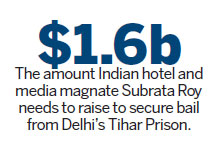India's jet-set tycoons see bloated business empires take turn for the worse
They were famed for their jet-set lifestyles and the names of their companies were emblazoned on airplanes, Formula One cars and the shirtfronts of cricket teams.
But now the debt-laden empires of three of India's best-known tycoons - Vijay Mallya, Subrata Roy and T. Venkattram Reddy - are crumbling before their eyes, downfalls that observers say stem from a climate of weak regulation and deference to conspicuous wealth.
"All too often, the banks are dazzled by the halo of personal fortunes," said Vishwas Utagi, a veteran campaigner for banking regulation.
Some of India's most successful businesses, such as the family-run Tata and Reliance conglomerates, have been led for years by men with little appetite for publicity and who prefer to operate in the shadows.
But Kingfisher boss Mallya and Sahara supremo Roy came to epitomize a new breed of tycoon, unafraid of trumpeting their achievements when they started making a name for themselves in the early 2000s.
Mallya - the self-styled "King of Good Times" - became something of an icon as he turned the United Breweries Group, which he inherited from his father, into one of the world's largest spirit makers.
As his core business flourished, Mallya branched out by launching the Kingfisher airline, named after his company's best-known beer.
His profile rose further when he acquired a stake in the Force India F1 team and ownership of the Royal Challengers Bangalore cricket team.

But as the Indian economy began to slow sharply at the turn of the decade, with the aviation industry becoming one of the sectors to be worst hit, Mallya's fortunes nosedived too.
After selling the liquor business to Diageo in a bid to shore up his airline, Mallya looked on helplessly as Kingfisher continued to hemorrhage cash. The airline never took to the skies again after a pilots' strike over unpaid wages in 2012.
Having run out of patience over Mallya's failure to clear debts said to be in excess of $60 million, the United Bank of India this month declared him a "wilful defaulter", making it nearly impossible to access fresh loans.
While Mallya is fighting to keep his properties from creditors, Roy is trying to sell his portfolio of luxury hotels - including New York's Plaza Hotel and Grosvenor House in London - to raise the $1.6 billion he needs to secure bail from Delhi's Tihar Prison.
While he has several media interests, including a Hindi TV channel and newspaper, Roy's profile was heightened by his co-ownership with Mallya of Force India and involvement in cricket.
As well as sponsoring the national side, Sahara set up a Pune-based franchise to enter the glitzy Indian Premier League.
The team's expulsion from the IPL at the end of last year's tournament in a dispute over finances hinted that all was not well.
Things dramatically worsened in March when Roy was detained after failing to meet a demand by regulators to pay back millions of small savers the $3.2 billion that Sahara raised via an illegal bond scheme.
While Roy owns homes modeled on the White House and Buckingham Palace, Reddy's penchant is for luxury cars with a fleet that reportedly included a Rolls Royce Phantom.
He also couldn't resist the glamor of the IPL, buying the Deccan Chargers franchise before it went bust in 2012.
While Roy's fortune was self-made, Reddy and his brother T. Vinayak Ravi Reddy inherited the ownership of the Deccan Chronicle from their father.
The Hyderabad newspaper's prestige enabled them to draw loans for riskier ventures including a chain of bookstores and a chartered jet company.
Even if the cricket team is no longer eating up money, the Reddys are struggling to keep the wolf from the door and lenders have already seized several of their properties.
Tamal Bandyopadhyay, author of a book on Sahara, said a weak regulatory framework enabled tycoons to build up debts that should never have been allowed.
"Mallya is a case of over-stretching and over-leveraging, while Roy is the case of exploiting regulatory arbitrage or the loopholes in regulation," Bandyopadhyay told AFP.
Utagi, a retired bank worker who is vice-president of the All India Bank Employees' Association, said there were too many "pliable people" in the industry who face little comeback if money they lend is not repaid.
(China Daily 09/22/2014 page10)














